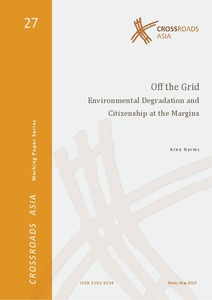Harms, Arne: Off the Grid: Environmental Degradation and Citizenship at the Margins. Bonn: Competence Network Crossroads Asia: Conflict – Migration – Development, 2015. In: Baldauf, Ingeborg; Conermann, Stephan; Kreutzmann, Hermann; Nadjmabadi, Shahnaz; Reetz, Dietrich; Schetter, Conrad; Sökefeld, Martin; Hornidge, Anna-Katharina; Bech Hansen, Claus Erik; Mielke, Katja (Hrsg.): Crossroads Asia Working Paper Series, 27.
Online-Ausgabe in bonndoc: https://hdl.handle.net/20.500.11811/162
Online-Ausgabe in bonndoc: https://hdl.handle.net/20.500.11811/162
@techreport{handle:20.500.11811/162,
author = {{Arne Harms}},
editor = {{Ingeborg Baldauf} and {Stephan Conermann} and {Hermann Kreutzmann} and {Shahnaz Nadjmabadi} and {Dietrich Reetz} and {Conrad Schetter} and {Martin Sökefeld} and {Anna-Katharina Hornidge} and {Claus Erik Bech Hansen} and {Katja Mielke}},
title = {Off the Grid: Environmental Degradation and Citizenship at the Margins},
publisher = {Competence Network Crossroads Asia: Conflict – Migration – Development},
year = 2015,
month = may,
series = {Crossroads Asia Working Paper Series},
volume = 27,
note = {In this paper I have presented some preliminary thoughts on political repercussions of environmental degradations on the margins. In order to do that I have embraced two approaches derived from political theory. First, I have reflected on the significance of ‘terrain’ and ‘territory’ insofar as they are overlaid with what I call the grid of property relations and bureaucratic spaces. The latter serves, I argued, as a means of governing populations and terrain. At the same time, they serve also as fraught access points to essential schemes, means and goods distributed by the state. I have framed them as nodes to access the state from below. In a second step I have reflected on the fragile state of citizenship and localized arrangements with power brokers in the lives of the poor for which spatial categories and quotidian objects are crucial. Against this background I have shown that environmental degradations amount at times to a dismantling of these fraught and fragile political relations. For they partly unmake access to state-administered schemes by dismantling the grid by destroying bureaucratic nodes and displacing bureaucracies.},
url = {https://hdl.handle.net/20.500.11811/162}
}
author = {{Arne Harms}},
editor = {{Ingeborg Baldauf} and {Stephan Conermann} and {Hermann Kreutzmann} and {Shahnaz Nadjmabadi} and {Dietrich Reetz} and {Conrad Schetter} and {Martin Sökefeld} and {Anna-Katharina Hornidge} and {Claus Erik Bech Hansen} and {Katja Mielke}},
title = {Off the Grid: Environmental Degradation and Citizenship at the Margins},
publisher = {Competence Network Crossroads Asia: Conflict – Migration – Development},
year = 2015,
month = may,
series = {Crossroads Asia Working Paper Series},
volume = 27,
note = {In this paper I have presented some preliminary thoughts on political repercussions of environmental degradations on the margins. In order to do that I have embraced two approaches derived from political theory. First, I have reflected on the significance of ‘terrain’ and ‘territory’ insofar as they are overlaid with what I call the grid of property relations and bureaucratic spaces. The latter serves, I argued, as a means of governing populations and terrain. At the same time, they serve also as fraught access points to essential schemes, means and goods distributed by the state. I have framed them as nodes to access the state from below. In a second step I have reflected on the fragile state of citizenship and localized arrangements with power brokers in the lives of the poor for which spatial categories and quotidian objects are crucial. Against this background I have shown that environmental degradations amount at times to a dismantling of these fraught and fragile political relations. For they partly unmake access to state-administered schemes by dismantling the grid by destroying bureaucratic nodes and displacing bureaucracies.},
url = {https://hdl.handle.net/20.500.11811/162}
}






